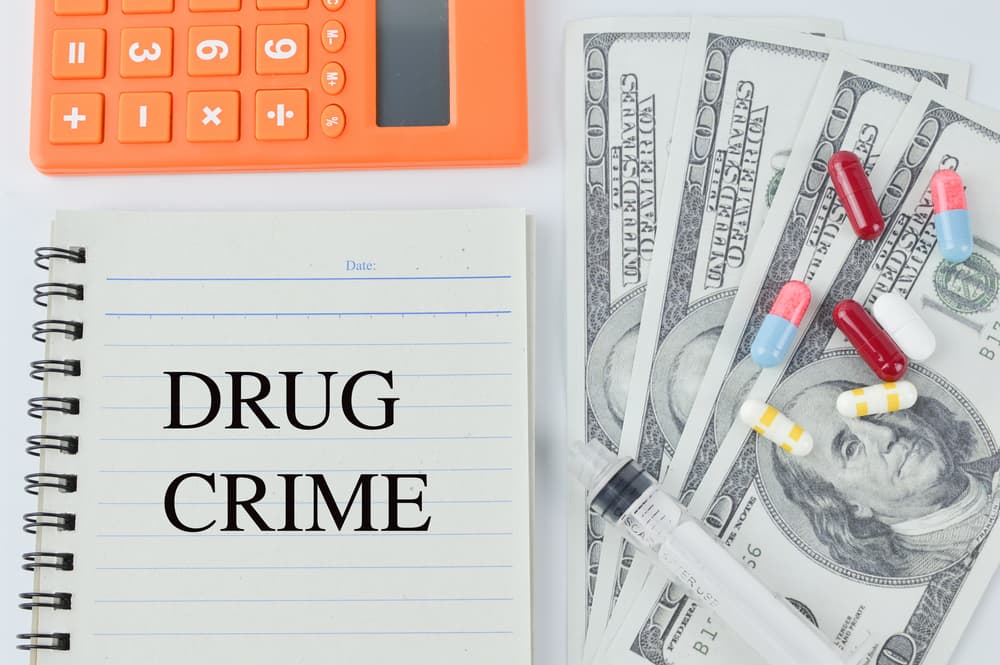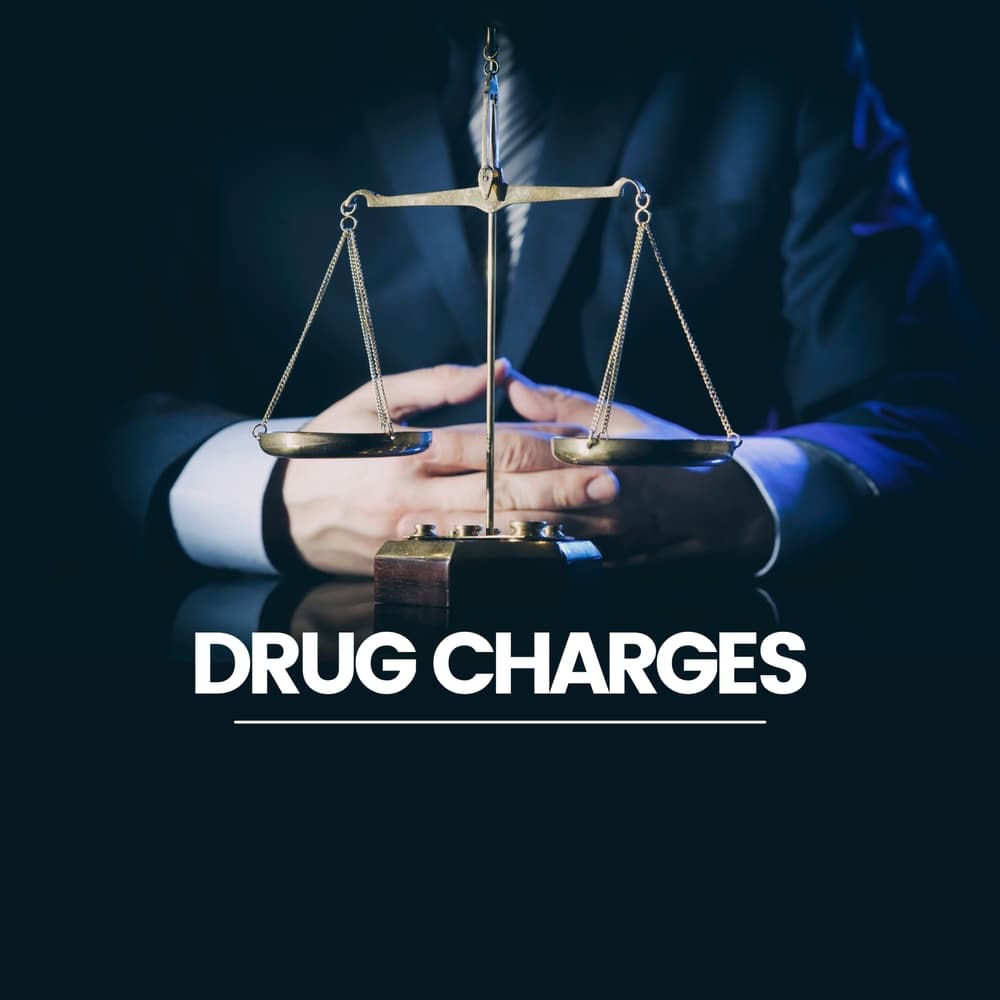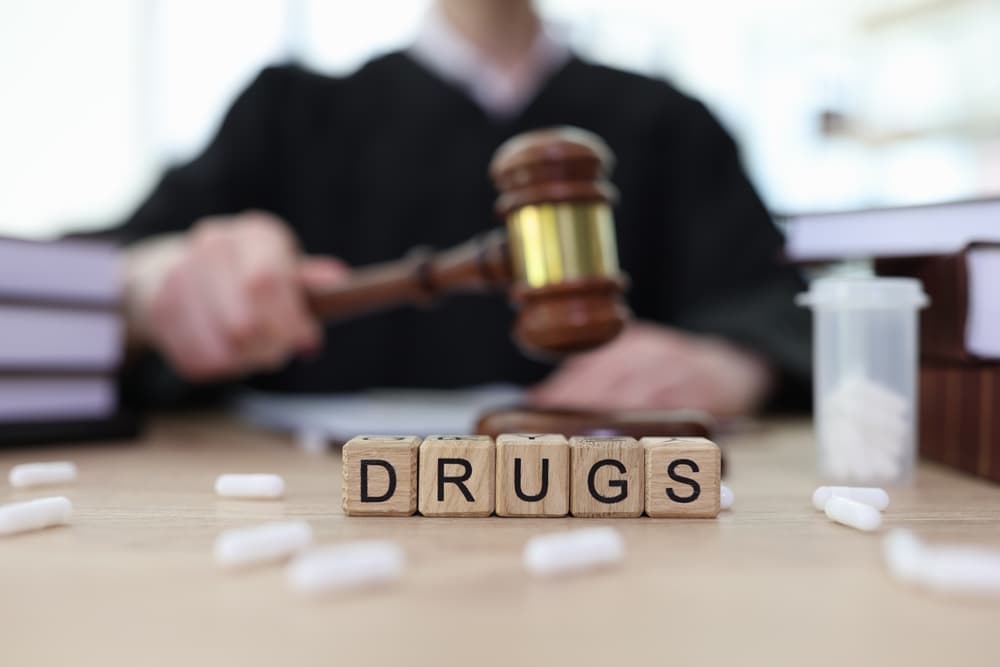Criminal drug charges are legal accusations involving the possession, distribution, trafficking, or manufacturing of illegal drugs. These charges can range from minor offenses, like possession of a small amount of marijuana, to more serious charges involving large-scale drug trafficking.
If you face a drug charge, you should first remain silent and avoid speaking to law enforcement without a lawyer present. Then, call a skilled drug crimes attorney as soon as possible. An experienced lawyer can evaluate your case, explain your options, protect your rights, and build a strong defense to achieve the best possible outcome in your case.
Most Common Drug Charges
Drug charges can vary widely depending on the type of drug, the amount in possession, and the circumstances surrounding the case. The most common drug charges people often face include possession, distribution, trafficking, and manufacturing. Here’s a breakdown of these charges:
Possession
This is one of the most frequently encountered drug charges. Possession occurs when someone is caught with illegal drugs, whether for personal use or otherwise. The charge's severity depends on the drug type and the amount found. For example, possessing small amounts of marijuana may lead to a misdemeanor charge in some states, while possessing large quantities of harder drugs like cocaine or heroin can result in felony charges. In some cases, even possession of drug paraphernalia, such as pipes or syringes, can lead to criminal charges.
Drug Distribution
Distribution charges occur when someone is accused of selling or intending to sell illegal drugs. Even if the individual isn’t caught with a large amount of drugs, authorities may charge them with distribution if they believe the person intended to distribute or sell the drugs. For example, if a person is caught with several small bags of drugs, they may face distribution charges even if they didn’t directly sell the drugs.
Drug Trafficking
This is one of the most serious drug charges. Trafficking involves the large-scale transportation or distribution of illegal drugs across state or national borders. Individuals caught trafficking drugs like methamphetamine, heroin, or cocaine face long prison sentences and hefty fines. Trafficking charges often involve extensive law enforcement investigations and can lead to federal charges, which are typically more severe than state charges.
Drug Manufacturing
Manufacturing drugs involves producing illegal substances, often in hidden labs. This charge is serious and can result in severe penalties. For example, someone caught making methamphetamine or growing marijuana in large quantities can face lengthy prison sentences. Law enforcement agencies take manufacturing charges seriously due to the potential danger these operations pose to communities.
Each drug charge carries different penalties, but all can result in significant legal consequences, including jail time, fines, and a permanent criminal record. The severity of the charge depends on several factors, such as the type of drug involved, the quantity, and whether it’s a first-time offense.
Potential Penalties and Collateral Consequences Upon Conviction of a Drug Crime

If you are convicted of a drug charge, the legal penalties may be severe, and the collateral consequences can affect many aspects of your life. The severity of the penalties depends on factors like the type of drug involved, the amount, whether the offense was a first-time or repeat violation, and the specific laws in your state. Here’s an overview of the most common legal penalties and collateral consequences individuals may face if convicted of a drug charge:
Legal Penalties:
- Imprisonment: One of the most serious penalties for drug convictions is jail or prison time. The length of the sentence depends on the charge, the type of drug, and the amount in question. For example, a conviction for possession of a small amount of marijuana may result in a few months in jail, while trafficking or manufacturing large quantities of drugs can lead to many years in federal or state prison. Repeat offenders often face harsher sentences.
- Fines: Fines are another common penalty. They can range from a few hundred dollars for minor drug offenses to tens of thousands of dollars for more serious charges like trafficking or manufacturing drugs. In addition to criminal fines, individuals may have to pay restitution if they were involved in activities that caused damage or harm to others, such as trafficking.
- Probation: Some individuals may be sentenced to probation instead of serving time in prison. During probation, the individual must meet specific court-established conditions, such as regular drug testing, community service, and attending drug treatment programs. Violating probation can result in a return to jail or prison.
- Mandatory Drug Treatment: In some cases, especially for individuals convicted of possession or first-time offenses, courts may require mandatory drug treatment or rehabilitation programs. These programs can be part of a plea deal or a condition for probation.
Collateral Consequences:
- Employment Challenges: A drug conviction can significantly affect your ability to find or keep a job. Many employers perform background checks, and a criminal record can disqualify you from certain positions, especially in fields like healthcare, education, or government.
- Loss of Professional Licenses: Certain professions require a license, such as teaching, healthcare, or law. A drug conviction can result in the suspension or permanent revocation of these licenses, making it difficult or impossible to work in that field.
- Loss of Voting Rights: In some states, a drug conviction can lead to losing voting rights, either temporarily or permanently, depending on the offense and the state’s laws.
- Effect on Family and Social Life: A criminal conviction, especially one involving drugs, can strain relationships with family and friends. It can also affect custody battles or other legal matters involving children.
- Public Stigma: Drug convictions can carry a social stigma, making it difficult for individuals to reintegrate into society. This can affect relationships, housing options, and social interactions.
A drug conviction can result in significant legal penalties and long-lasting collateral consequences that affect many areas of your life. It’s important to understand the potential risks involved and seek legal counsel if you are facing drug charges.
Steps to Take After Incurring a Criminal Drug Charge

If you’ve been charged with a criminal drug offense, it’s important to take immediate, thoughtful steps to protect your rights and minimize the effect of the charge on your life. A criminal drug charge can have serious consequences, from jail time to a permanent criminal record. The steps you take after an arrest or charge can make a significant difference in the outcome of your case. Here are the most important steps you can take:
Remain Silent and Avoid Self-Incrimination
The first thing you can do after being arrested or charged with a drug offense is to remain silent and avoid speaking to law enforcement without a lawyer present. Anything you say can be used against you in court. Even if you believe you are innocent or want to explain your side, it’s important to remember that your words can be misinterpreted. Politely decline to answer questions until you’ve consulted a criminal defense lawyer.
Retain a Knowledgeable Criminal Defense Attorney
One of the most important steps is hiring a skilled and experienced criminal defense attorney who regularly handles drug cases. A lawyer with experience will be familiar with local and state laws and the best strategies for defending against drug charges. They will investigate the facts of your case, examine the evidence, and determine if your rights were violated during your arrest. A qualified attorney can often negotiate a plea deal or even get charges reduced or dismissed. Having legal representation will give you the best chance at a favorable outcome.
Understand the Charges and Penalties
Your attorney will explain the charges you are facing and the potential penalties. Drug charges can vary greatly depending on the type and amount of the drug, whether the offense involved minors and your criminal history. Understanding the potential consequences, including jail time, fines, or mandatory drug programs, will help you make informed decisions about how to proceed with your defense.
Follow Your Lawyer’s Advice
Once you’ve hired a criminal defense attorney, following their advice closely is essential. They will guide you through the legal process and ensure you understand what to expect. They may advise you to avoid certain actions, like contacting witnesses or making statements about the case on social media, which can harm your defense.
Prepare for Court and Other Legal Proceedings
Depending on the severity of the charge, you may need to attend hearings, pre-trial conferences, or even a trial. Your attorney will prepare you for these, explaining what will happen at each stage and how you can conduct yourself. They will also be your advocate in court, arguing for a reduction in charges or a more lenient sentence, if applicable.
Consider Rehabilitation and Treatment Options
In some cases, especially for first-time offenders or those involved in possession charges, entering a rehabilitation or drug treatment program may be beneficial. Not only can this show the court that you are taking responsibility for your actions, but it may also improve your chances of receiving a lighter sentence, such as probation, instead of jail time.
Facing a criminal drug charge is a serious matter, but by taking the right steps, you can protect your rights and build a strong defense. Remaining silent, hiring an experienced criminal defense attorney, understanding the charges, and following your lawyer’s guidance are crucial to navigating the legal system. If you are proactive and informed, you will have a better chance of achieving the best possible outcome in your case.
Important Defenses to a Drug Charge

If you are facing a criminal drug charge, several legal defenses may be available to fight the charges or reduce the consequences. The specific defense strategy will depend on the facts of your case, the type of drug charge, and the evidence against you. Here are some of the most important legal defenses that you may raise:
- Lack of Knowledge: One of the most common defenses in drug cases is that you did not know the drugs were in your possession. This defense is particularly useful if the drugs were found in a place where you had no control, like a car or a shared apartment. For example, if someone else left drugs in your bag without your knowledge, you can argue that you did not knowingly possess the drugs. However, you must show that you had no reasonable way of knowing the drugs were there.
- Illegal Search and Seizure: The Fourth Amendment protects you from unreasonable searches and seizures. If the police did not have a valid warrant or probable cause to search you, your home, or your vehicle, any drugs found during that search may be inadmissible in court. If law enforcement violated your constitutional rights by conducting an illegal search, your attorney may get the evidence thrown out, weakening the prosecution’s case against you.
- Entrapment: Entrapment occurs when law enforcement officers induce or encourage someone to commit a crime they otherwise would not have committed. If you can show that the police or an informant pushed you into committing the drug offense, this may be a valid defense. For example, if undercover officers coerced you into selling drugs or pushed you into buying drugs you otherwise wouldn’t have, your lawyer may argue that you were entrapped.
- Lack of Possession: In drug cases, possession is a key element that the prosecution must prove. You can challenge the claim of possession by showing that the drugs did not belong to you or that you did not have control over them. For example, if the drugs were in a shared area or someone else’s belongings, your lawyer can argue they were not yours and you did not possess them.
- Unlawful Search or Arrest: If you were arrested without probable cause or if the police violated any procedural rules in making the arrest, your lawyer may argue that the arrest was unlawful. An unlawful arrest can lead to the exclusion of any evidence found as a result of that arrest, potentially weakening the prosecution’s case.
- Mistaken Identity: Some individuals are wrongfully accused of possessing or distributing drugs due to mistaken identity. If the police or witnesses misidentified you as the person who committed the crime, your defense attorney may present evidence that you were not the individual involved.
- Duress: Duress is a defense that claims you were forced to commit a drug-related crime under threat of immediate harm or violence. For example, if someone threatened you or your family unless you participated in drug trafficking or distribution, your attorney may argue you acted under duress and cannot be held criminally responsible.
The best course of action is to consult with an experienced criminal defense attorney who can evaluate the specifics of your case and determine the most effective defense strategy.
Call an Experienced Criminal Defense Lawyer in Your Area Today
If you are currently facing a drug charge, it's essential to have a knowledgeable California criminal defense lawyer on your side right away. Your lawyer can determine your options and secure the best possible result for your criminal case.